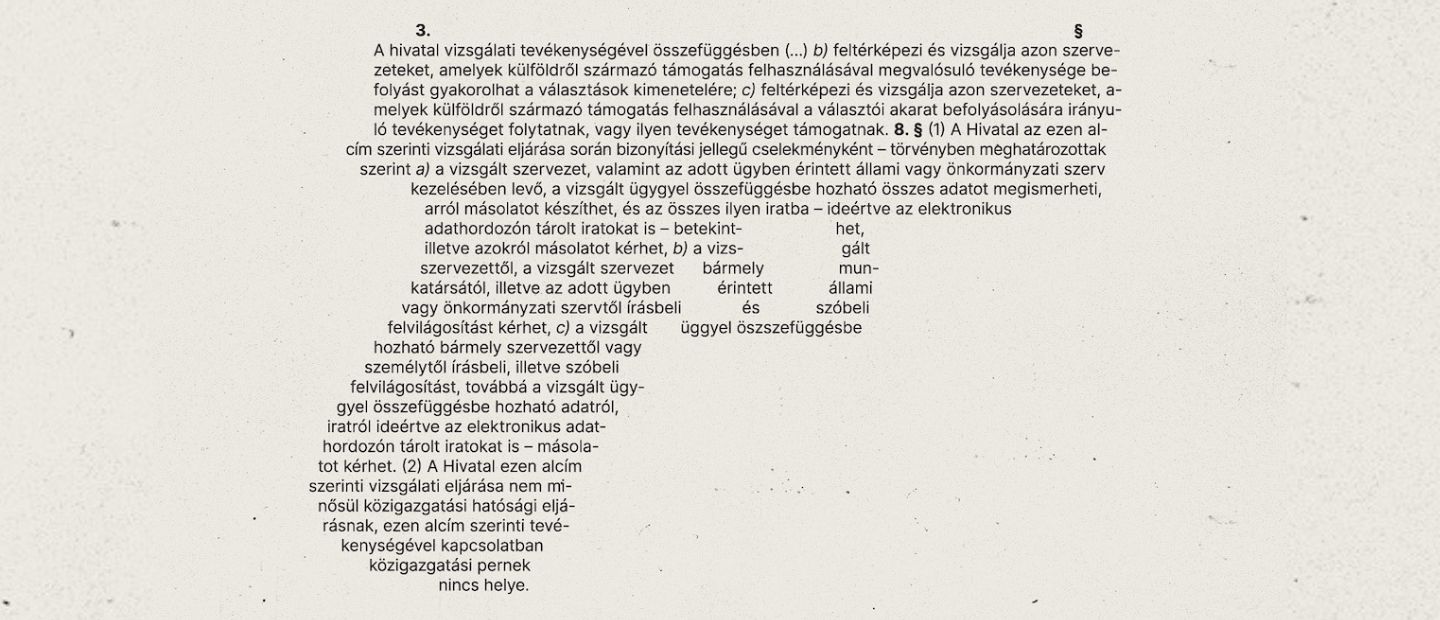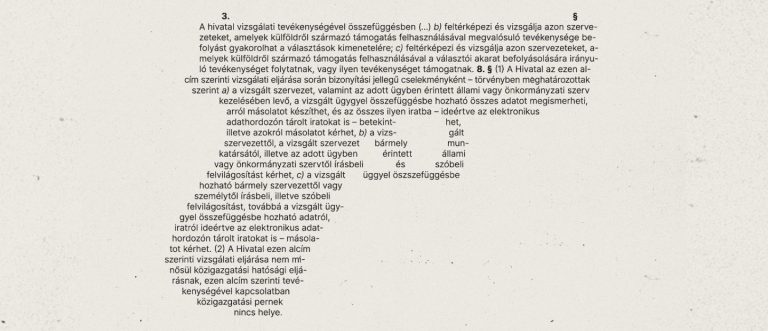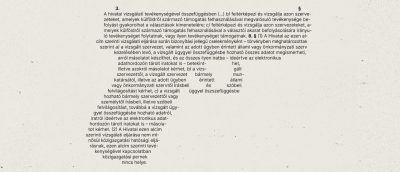Cover image: Péter Somogyi (szarvas) / Telex 2024-11-22
Cover image: Péter Somogyi (szarvas) / Telex 2024-11-22
“We find it ironic that an authority claiming to protect national sovereignty against foreign interference in Hungary — and using Hungarian state resources to do so — is actually attacking and smearing independent organizations in other countries.” Statement by VSquare and Reporters Foundation on the Hungarian Sovereignty Protection Office’s attack on Atlatszo.hu and its international – including Polish – partners.
In early November, a Hungarian government authority launched an attack on Atlatszo.hu, an award-winning investigative journalism center with which we have collaborated for many years. Atlatszo.hu has long been a thorn in Hungarian Prime Minister Viktor Orbán’s side, investigating corruption within his inner circle and publishing stories ranging from the use of private jets and luxury yachts to the misuse of EU funds.
The so-called Sovereignty Protection Office (SPO), established by the Orbán government through a Russia-style “Defense of Sovereignty” law late last year, was created to label independent civil society organizations and media outlets as “foreign agents.” It resembles similar laws in Russia, which have inspired copycats all over the world, including, recently, in Georgia.
Ten independent Hungarian media outlets, along with over 130 Hungarian civil society organizations, have protested the law under which the SPO was founded. The European Commission has found that this law violates EU regulations and has decided to take Hungary to the European Court of Justice over it.
Earlier this year, the SPO launched one of its first investigations into Transparency International Hungary, an anti-corruption watchdog, and the investigative journalism collective Atlatszo.hu. That investigation has now led to a report accusing Atlatszo.hu of being part of a “network representing American interests worldwide, often counteracting the interests of target countries.”
The report claims that Atlatszo.hu’s public information requests and collaboration with international partners constitute “supplying ammunition to the foreign side for its intelligence and influence operations.” Among the other perceived threats identified by the Hungarian regime in this report are organizations like the Organized Crime and Corruption Reporting Project (OCCRP), a global network of investigative journalism, as well as VSquare, the regional investigative network that we launched in 2017.
According to the SPO’s report, “the focus of VSquare.org — in line with the American geopolitical agenda — includes topics such as Russian and Chinese influence, disinformation, espionage, corruption, and illiberal trends.” The SPO also lists VSquare.org’s core partners from the region — Frontstory.pl, Investigace.cz, the Investigative Center of Ján Kuciak and Direkt36.hu — as members of what they present as a U.S. intelligence and influence network.
The Orbán regime’s propaganda report misrepresent reality. VSquare is published by the Polish Reporters Foundation (Fundacja Reporterów), a Warsaw-based non-profit journalistic organization that also publishes Frontstory.pl. As our colleagues at Atlatszo.hu rightly point out, the report is a clear example of Soviet-era propaganda, a callback to a time when the authorities warned citizens about “imperialist agents.” Counting on the integrity of the courts in Budapest, Atlatszo.hu has filed a lawsuit against the Office for the Protection of Sovereignty for defamation.
VSquare and Fundacja Reporterów stand in full solidarity with Atlatszo.hu, rejecting the SPO’s allegations and slander.
VSquare and its partners have long investigated how the Hungarian regime and its proxies attempt to influence media and public opinion in Central Europe. We exposed how the Hungarian government flooded the region with online advertisements during its 2023 elections; we unmasked Viktor Orbán’s top Polish social media propagandist, revealing him to be a well-known Polish pro-Kremlin pundit; and we revealed how former CEO of Orlen and PiS MEP candidate Daniel Obajtek conducted much of his social media campaign secretly from a Budapest luxury apartment owned by Orbán family associates. We also reported on the latest developments in Orbán proxies’ failed takeover attempt of Poland’s TVN.
We find it ironic that an authority claiming to protect national sovereignty against foreign interference in Hungary — and using Hungarian state resources to do so — is actually attacking and smearing independent organizations in other countries. The SPO’s existence and activities exemplify how the Hungarian regime is attempting to export its interference and suppression of independent media to other European Union member states, such as Poland.
About VSquare’s mission: VSquare is one of the leading regional voices of investigative journalism in Central Europe. Its articles are fact-checked and thoroughly edited. We maintain an impenetrable wall between our editorial decisions and sources of all revenue. We are non-profit, independent, investigative, and driven by a passion for journalism.
Anna Gielewska, editor-in-chief, VSquare
Wojciech Cieśla, chairman, Fundacja Reporterów
What is the Sovereignty Protection Act?
Source: Hungarian Helsinki Committee
In December 2023, the Hungarian Parliament adopted Act LXXXVIII of 2023 on the Protection of National Sovereignty. The Act consists of two main pillars: establishing a new Sovereignty Protection Office (SPO) to carry out investigations, and amending the Criminal Code to sanctions electoral candidates and representatives of nominating organizations using prohibited foreign funds for campaigning purposes with up to three years of imprisonment.
Over 100 civil society organizations, more than 15,000 citizens, and 10 independent media outlets strongly criticized the new law. The Council of Europe Commissioner for Human Rights called for the abandonment of the proposal, the UN Special Rapporteur on Freedom of Expression and the Special Rapporteur on Human Rights Defenders noted the imminent negative implications of the adoption of the proposal in their joint communication to the Hungarian Government. The Monitoring Committee of the Parliamentary Assembly of the Council of Europe seized the Venice Commission to provide an opinion on the proposal.
On February 7, 2024 the European Commission announced that it decided to launch an infringement procedure against Hungary for violating EU law on the Defence of Sovereignty. On October 3, 2024, the European Commission referred Hungary to the Court of Justice because it considers this national law to be in breach of EU law.
Subscribe to Goulash, our original VSquare newsletter that delivers the best investigative journalism from Central Europe straight to your inbox!







